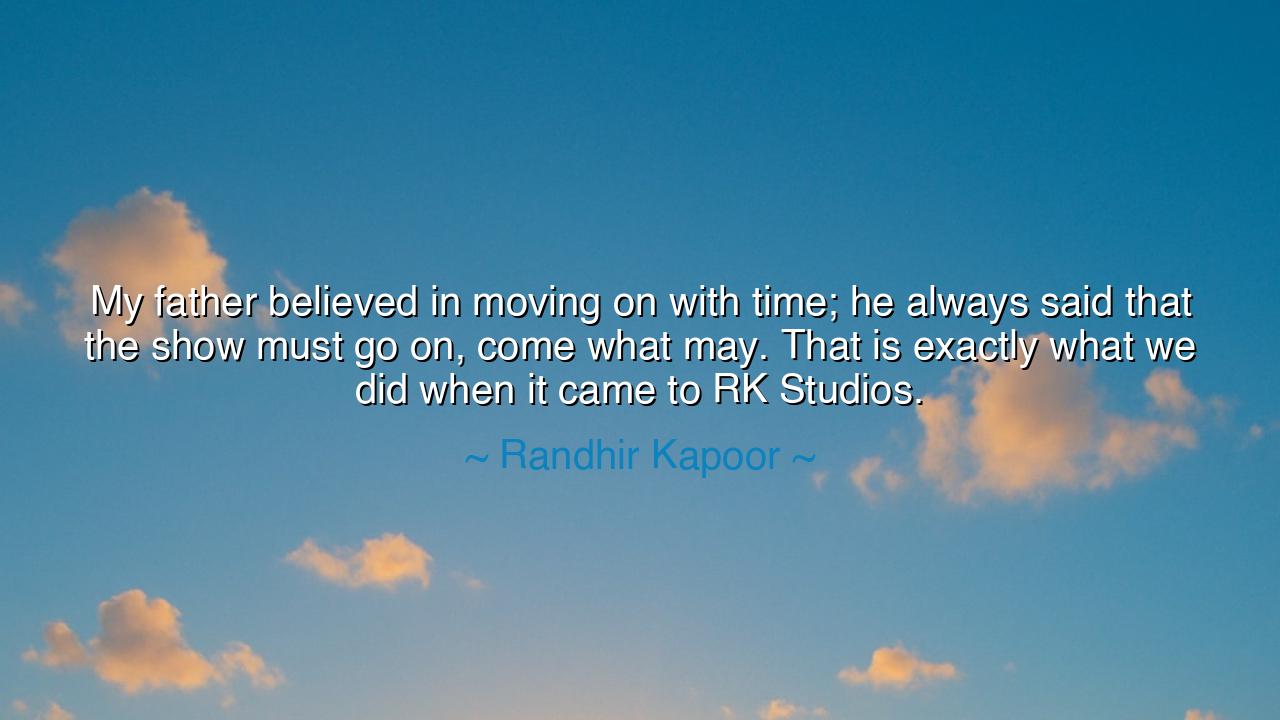
My father believed in moving on with time; he always said that
My father believed in moving on with time; he always said that the show must go on, come what may. That is exactly what we did when it came to RK Studios.






The actor Randhir Kapoor, son of the legendary Raj Kapoor and heir to a dynasty of Indian cinema, once said: “My father believed in moving on with time; he always said that the show must go on, come what may. That is exactly what we did when it came to RK Studios.” These words carry the weight of tradition and the fire of resilience. They speak of a family that built dreams upon celluloid, weathered storms of change, and embraced the eternal truth that life, like theater, must continue even in the face of loss.
The phrase “the show must go on” is not born of vanity, but of courage. It is the creed of those who labor in the arts, whose craft is exposed to the gaze of the world. Behind the curtain there may be heartbreak, illness, even death, yet the curtain must still rise. To live by this principle is to declare that adversity shall not silence creation. Raj Kapoor, the patriarch, embodied this spirit, teaching his sons that time does not wait for grief, nor does destiny pause for nostalgia. To move on with time is not to forget the past, but to honor it by walking forward with its lessons.
The sale of RK Studios, founded by Raj Kapoor himself, was not merely a business decision but a symbolic act of moving on. The place where classics were born, where generations poured their hearts into the silver screen, was deeply tied to memory and emotion. Yet the family, guided by their father’s wisdom, chose not to cling to bricks and mortar. Instead, they embraced the truth that art lives not in buildings but in hearts, and that the real legacy is not a studio, but the courage to keep creating.
History offers us many parallels. Consider the fall of Constantinople in 1453. For centuries, Byzantium had stood as a beacon of culture and faith. When it fell, many believed all was lost. Yet the scholars of the city fled to the West, carrying with them the manuscripts and wisdom of Greece and Rome. In this way, they planted the seeds of the Renaissance. The city was gone, but the show went on. The wisdom here is the same: when the form perishes, the spirit must move forward, or else both are lost.
Randhir Kapoor’s words remind us that life itself is a theater. We may lose homes, institutions, even people we thought eternal. Yet the strength of the human heart lies in carrying forward. To dwell endlessly on what is gone is to betray its memory; to move forward is to preserve it in living form. The fire of the past does not burn in monuments alone, but in the courage to keep walking into the unknown.
The lesson is this: do not be enslaved by nostalgia. Treasure the past, yes, but do not cling to it as though it were eternity. Time is a river that flows ever forward, and those who stand still are left behind. Instead, take from the past its wisdom, its inspiration, its strength, and use these as torches to light the road ahead. The building may fall, the stage may close, but the play of life continues.
Practical wisdom follows: when faced with endings — the loss of a place, a relationship, or a chapter of your life — remember Raj Kapoor’s teaching through his son’s words. Say to yourself: “The show must go on.” Do not linger forever in grief. Take the essence of what you loved, and carry it into the next act. Build anew, create anew, live anew, for life waits for no one.
So remember, O listener, the wisdom of Randhir Kapoor: “Move on with time. The show must go on, come what may.” Let this be your creed in loss and in change. For though the curtain falls, it rises again, and it is in that rising that the story of your life continues, stronger, braver, and filled with the spirit of those who came before you.






AAdministratorAdministrator
Welcome, honored guests. Please leave a comment, we will respond soon